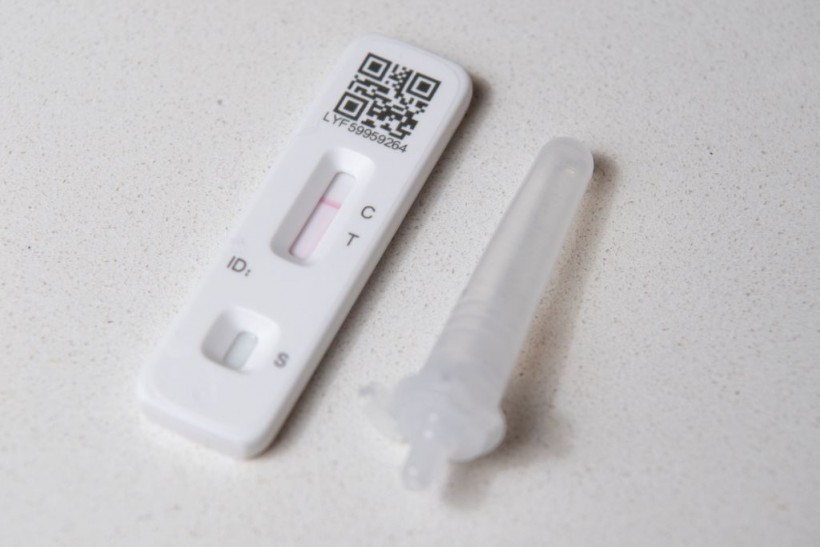Common COVID-19 symptoms such as headache, body aches, and cough should return a positive result from antigen tests. However, some people still get a negative result, which puts them in a dilemma whether they do have the SARS-CoV-2 virus or the flu, or both (flurona).
It is indeed stressful as influenza and novel coronavirus cases are increasing. Usually, people who display these symptoms are asked to isolate for at least five days to avoid transmission. But why do some people get negative results from antigen tests even while having the symptoms and how to tell the difference between the two infections?

A Covid-19 Lateral Flow (LFT) self-test kit, containing a SARS-CoV-2 Antigen Rapid Test, supplied by Britain's National Health Service (NHS), is arranged for a photograph in Brenchley, south east England, on December 14, 2021.
Influenza and COVID-19 Have Almost Similar Symptoms
COVID-19 and influenza (flu) are both illnesses in the upper respiratory tract caused by different viruses, the Centers for Disease Control and Prevention (CDC) said. The SARS-CoV-2 virus causes COVID-19, while any known influenza viruses cause the flu.
Both infections may display similar symptoms, such as fever, cough, shortness of breath, or difficulty breathing, sore throat, fatigue, runny and stuffy nose, headache, body ache, diarrhea, vomiting, and change or loss of senses of taste or smell. However, COVID-19 seems to spread more easily than flu, and a loss or change in taste or smell is more common in those infected with the novel coronavirus.
As more people get vaccinated against COVID-19, its transmission should also slow down. However, the Omicron and Delta variants pose a greater threat for unvaccinated people. Experts said that those exposed to infected people usually report dry cough and shortness of breath, Market Watch reported.
But since most symptoms of COVID-19 and influenza are nearly identical, health agencies reiterated that testing, like antigen tests, is necessary to identify which infection people have. On the other hand, some people could still get a negative result from antigen tests for the first three days before the virus grows. Their immune system, with the help of vaccines, could either defeat the virus or not.
ALSO READ: Throat Swabs Better Than Nasal Swabs Among Rapid Tests, Experts Claim
How Accurate are Antigen Tests?
Antigen tests, or popularly known as rapid tests, provide test results within minutes and do not need samples to be analyzed in a laboratory by a specialist. Healthline reported that rapid tests could be performed at home, at a doctor's clinic, pharmacies, school clinics, long-term care facilities, airports, and drive-through testing sites.
A sample is taken through a cotton swab inserted into the nose and throat to collect mucus and cells. Then it is applied to a strip that changes color if the sample contains SARS-CoV-2, indicating a positive result of COVID-19.
Despite providing quick results, they are not as accurate as PCR tests done in laboratories. The latter requires more of the viral RNA in the sample to report a positive result, reducing the chances of a false negative and false positive.
That means rapid tests came with a high risk of giving false results. Due to that, experts recommend doing multiple tests to confirm test results.
RELATED ARTICLE: COVID-19 Omicron Variant Detection Method: Saliva Swabs More Effective, Rapid Tests Not Recommended
Check out more news and information on COVID-19 in Science Times.














